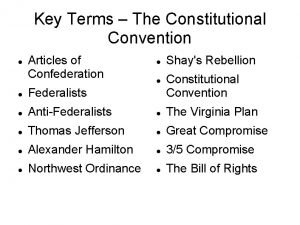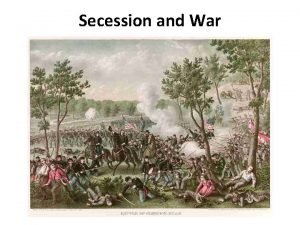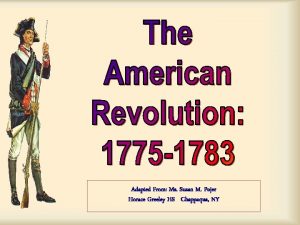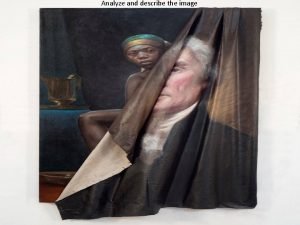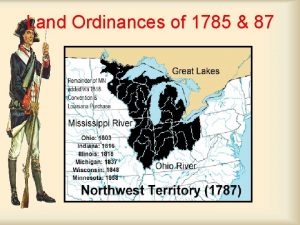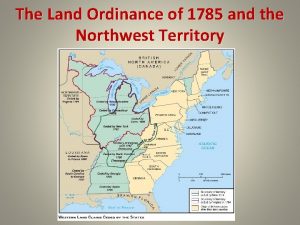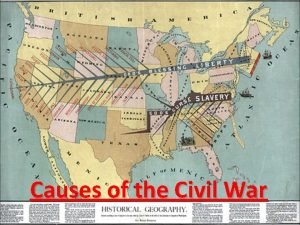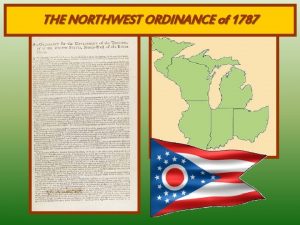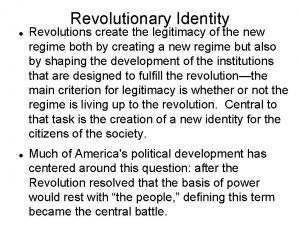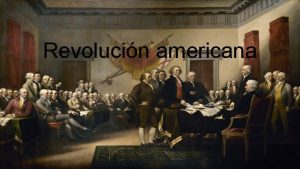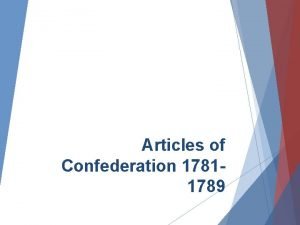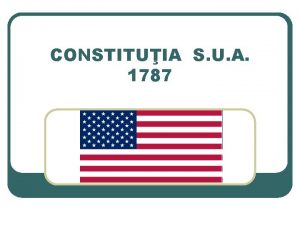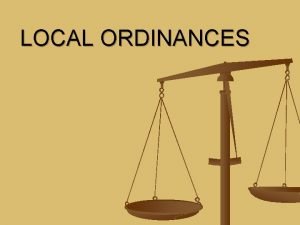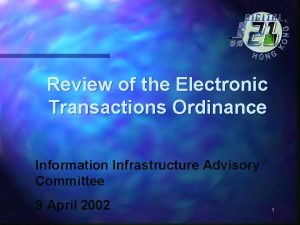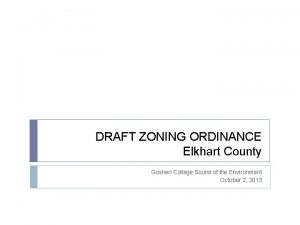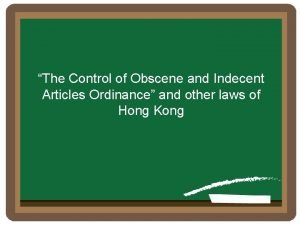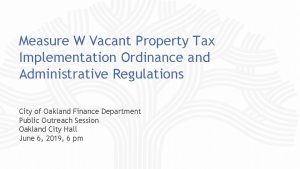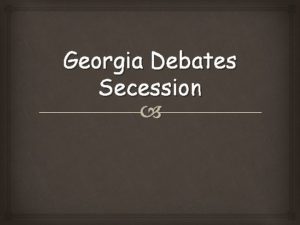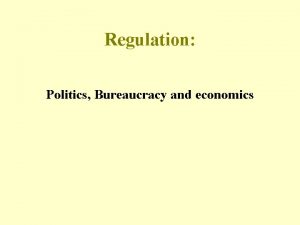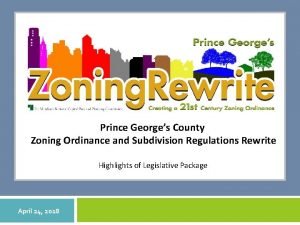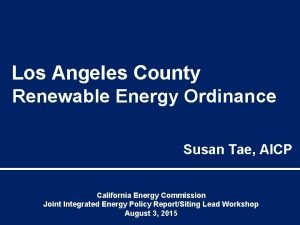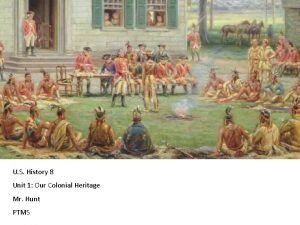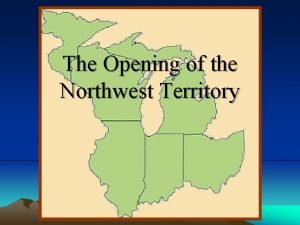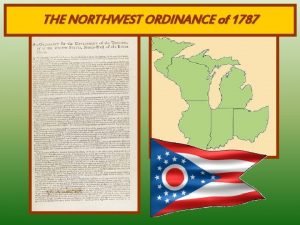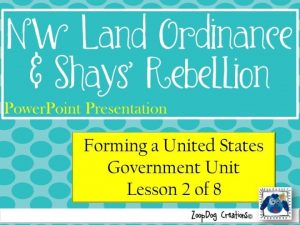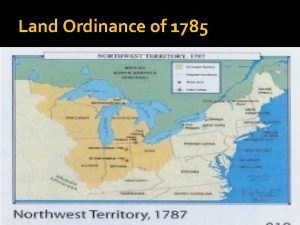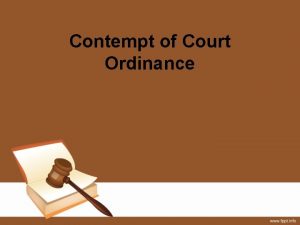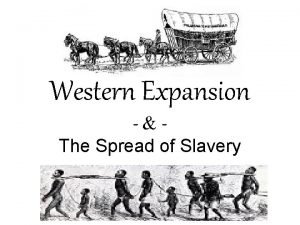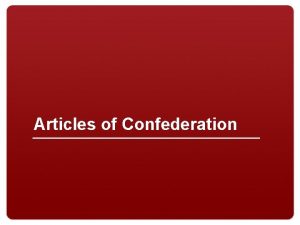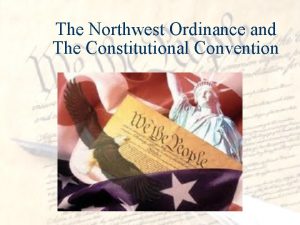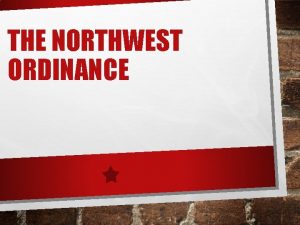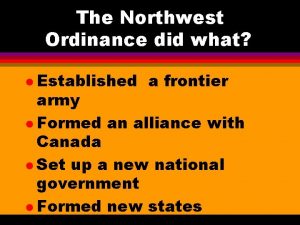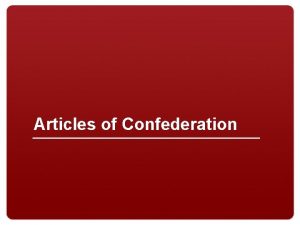NORTHWEST ORDINANCE The Northwest Ordinance 1787 was an















































![The Second Great Awakening “Spiritual Reform From Within” [Religious Revivalism] Social Reforms & Redefining The Second Great Awakening “Spiritual Reform From Within” [Religious Revivalism] Social Reforms & Redefining](https://slidetodoc.com/presentation_image_h2/7f28535d27e453ea27a421d448357ee3/image-48.jpg)
























![Jackson’s Opponents in 1824 Sectional Differences Henry Clay [KY] John Quincy Adams [MA] William Jackson’s Opponents in 1824 Sectional Differences Henry Clay [KY] John Quincy Adams [MA] William](https://slidetodoc.com/presentation_image_h2/7f28535d27e453ea27a421d448357ee3/image-73.jpg)















- Slides: 88

NORTHWEST ORDINANCE • The Northwest Ordinance 1787 – was an act of the Congress of the Confederation of the United States which created the Northwest Territory (first organized territory of the US) – Arguably the single most important piece of legislation passed by members of the earlier Continental Congresses other than the Declaration of Independence – It established the precedent by which the US would expand westward across North America by the admission of new states, rather than by the expansion of existing states. • Further, the prohibition of slavery in the territory had the effect of establishing the Ohio River as the boundary between free and slave territory in the region. This division helped set the stage for the balancing act between free and slave states • Set aside land for Public Schools

Northwest Territory


Thomas Jefferson and the Louisiana Purchase SSUSH 6 B

Thomas Jefferson • Major Event – Louisiana Purchase

Louisiana Purchase • Purchased from Napoleon (France) in 1803 for $15 million • Doubled the size of the US

Lewis & Clark Expedition • Jefferson sent Meriwether Lewis and William Clark to explore Louisiana and the western lands all the way to the Pacific Ocean. • Lewis and Clark – charted the trails west, – mapped rivers and mountain ranges, – wrote descriptions and collected samples of unfamiliar animals and plants, – recorded facts and figures about the various Native American tribes and

Manifest Destiny • Americans believed we were destined to extend our borders from the Atlantic to Pacific Oceans (Our GOD Given Right) • Use belief in Manifest Destiny to justify: • Westward Expansion • Indian Removal • Other reasons for moving west: Manifest Destiny Cartoon • Land ownership (abundant land, prosperity) • Living space (many new immigrants) • New markets/harbors to open trade to Asia • Employment opportunities (some avoiding creditors after the Panic of 1837) • Spread virtues of Democracy and


“Manifest Destiny” § First coined by newspaper editor, John O’Sullivan in 1845. § ". . the right of our manifest destiny to over spread and to possess the whole of the continent which Providence has given us for the development of the great experiment of full expansion of its principle and destiny of growth. " § A myth of the West as a land of romance and adventure emerged.

National Origin of Immigrants: 1820 - 1860 Why now?

Trails Westward

Territorial Growth to 1853

Territorial Growth to Expansionist Young America in the 1850 s

SSUSH 6 C


1. Impressment • 1808 -1811 Britain impressed over 6, 000 American sailors. • Impressment – kidnapping of American sailors and placement into the British Navy

2. British Instigation of Indians British General Brock Meets with Tecumseh

Battle of Tippecanoe, 1811 • General William Henry Harrison governor of the Indiana Territory. • Tecumseh organized a confederacy of Indian tribes to fight for their homelands. • Tecumseh’s brother fought against Harrison and was defeated at Tippecanoe. • This made Harrison a national hero! [1840 election Tippecanoe & Tyler, too!]

“Tecumseh’s Curse” • "'Harrison will win next year to be the Great Chief…. . He will die in his office…. . I who caused the Sun to darken and Red Men to give up firewater tell you Harrison will die. And after him, every Great Chief chosen every 20 years thereafter will die. And when each one dies, let everyone remember the death of our people. "

1840, William Henry Harrison Died April 6, 1841 of pneumonia. 1860, Abraham Lincoln Assassinated April 14, 1865 1880, James Abram Garfield Assassinated July 2, 1881 1900, William Mc. Kinley Assassinated September, 6 1901 1920, Warren Gamaliel Harding Died August 2, 1923 from food poisoning 1940, Franklin Delano Roosevelt Died April 12, 1945, stroke, medical records missing 1960, John Fitzgerald Kennedy Assassinated November 22, 1963 1980, Ronald Wilson Reagan Assassination attempt on March 30, 1981

3) “War Hawks” Our ultra aggressive Congress wanted war with Great Britain over land in Canada Henry Clay [KY] John C. Calhoun [SC]

American Problems • The US was unprepared militarily: • Had a 12 -ship navy vs. Britain’s 800 ships. • Americans disliked a draft preferred to enlist in the disorganized state militias. • Financially unprepared: • Flood of paper $. • Revenue from import tariffs declined.

Battle of Fort Mc. Henry, 1814 Oh Say Can You See By the Dawn’s Early Light… -- Francis Scott Key

The Battle of New Orleans, 1815

War Ends • Treaty of Ghent (1814) –Ends war with GB in the War of 1812 Effects of War of 1812 NATIONALISM- Intense Pride in Ones Country Americans began to see Themselves as a true Country USA WINS!!!

Andrew Jackson Takes Florida • Adams –Onis Treaty (1819)- United States gets Florida from Spain

Monroe Doctrine • SSUSH 6 E. Describe the reasons for and importance of the Monroe Doctrine

Basic Ideas of the Monroe Doctrine • Western Hemisphere was closed to further European colonization • US would not interfere with existing colonies of European powers • Any attempt by European powers to intervene in the Western Hemisphere would be regarded as “dangerous to our peace and safety”

Significance • Promoted American nationalism (pride) • Displayed American strength in world affairs • Attempt to isolate the Western Hemisphere from Europe (isolationism)


Industrialization and Eli Whitney • SSUSH 7 A SSUSH 7 Students will explain the process of economic growth, its regional and national impact in the first half of the 19 th century, and the different responses to it. a. Explain the impact of the Industrial Revolution as seen in Eli Whitney’ invention of the cotton gin and his development of interchangeable parts for muskets

Industrial Revolution • Late 18 th-early 19 th century-Began in GB • Advances in technology • Before-economies relied on artisans, merchants, farmers • After-factories relied on mechanization • Replaced manual labor with industry

Eli Whitney’s Cotton Gin, 1791 Actually invented by a slave!

South-Cotton Kingdom • Result of the cotton gin: – Cotton became the most profitable crop – Basis of the South’s economy during the 1800’s – Cotton gin led to a boom in cotton plantations – Made the South dependent on slave labor

Eli Whitney’s Gun Factory Interchangeable Parts Rifle

Eli Whitney • Interchangeable parts spread to other industries and became a key principle behind industrial development.

Erie Canal and the rise of NYC • d. Describe the construction of the Erie Canal, the rise of New York City, and the development of the nation’s infrastructure.

Erie Canal System

Erie Canal Construction • Completed in 1825 • New York • Governor De Witt Clinton Effects: • Links the Great lakes to the Atlantic Ocean – Transportation for westward settlers – Farmers could ship produce eastward at reduced cost – New York became the leading commercial center

Erie Canal, 1820 s Begun in 1817; completed in 1825

Erie Canal • 363 Miles long • 40 feet Wide • 4 Feet Deep

Robert Fulton & the Steamboat The Clermont

Steamboat Effects • • Increased transportation Quicker & Cheaper Promoted trade along major rivers Travel upstream

John Deere & the Steel Plow (1837)


Temperance Movement, Abolitionism, and Public schools • SSUSH 7 C
![The Second Great Awakening Spiritual Reform From Within Religious Revivalism Social Reforms Redefining The Second Great Awakening “Spiritual Reform From Within” [Religious Revivalism] Social Reforms & Redefining](https://slidetodoc.com/presentation_image_h2/7f28535d27e453ea27a421d448357ee3/image-48.jpg)
The Second Great Awakening “Spiritual Reform From Within” [Religious Revivalism] Social Reforms & Redefining the Ideal of Equality Temperance Education Abolitionism Asylum & Penal Reform Women’s Rights

Penitentiary Reform Dorothea Dix (1802 -1887) 1821 first penitentiary founded in Auburn, NY R 1 -5/7

Temperance Movement 1826 - American Temperance Society “Demon Rum”! Frances Willard R 1 -6 The Beecher Family

Annual Consumption of Alcohol

“The Drunkard’s Progress” From the first glass to the grave, 1846

Educational Reform Religious Training Secular Education • • Massachusetts always on the forefront of public educational reform * 1 st state to establish tax support for local public schools. By 1860 every state offered free public education to whites. * US had one of the highest literacy rates.

Horace Mann (1796 -1859 “Father of American Education” R 3 -6 • children were clay in the hands of teachers and school officials • children should be “molded” into a state of perfection • • discouraged corporal punishment established state teachertraining programs

Abolitionist Movement • 1816 American Colonization Society created (gradual, voluntary emancipation. British Colonization Society symbol

Abolitionist Movement • Create a free slave state in Liberia, West Africa. • No real anti-slavery sentiment in the North in the 1820 s & 1830 s. Gradualists Immediatists

William Lloyd Garrison (1801 -1879) • Slavery & Masonry undermined republican values. • Immediate emancipation with NO compensation. • Slavery was a moral, not an economic issue. • End slavery NOW R 2 -4

The Liberator Premiere issue January 1, 1831 R 2 -5

Read the primary source. What point is the author trying to make? “I am aware that many object to the severity of my language; but is there not cause for severity? I will be as harsh as truth and as uncompromising as justice. On this subject, I do not wish to think or speak, or write, with moderation. No! Tell a man whose house is on fire, to give a moderate alarm; tell him to moderately rescue his wife from the hands of the ravisher; tell the mother to gradually [remove] her babe from the fire into which it has fallen – but urge me not to use moderation in a cause like the present. I am in earnest – I will not equivocate – I will not excuse – I will not retreat a single inch – AND I WILL BE HEARD. ” - From the Liberator, January 1, 1831

Frederick Douglass (1817 -1895) 1845 The Narrative of the Life Of Frederick Douglass 1847 “The North Star” R 2 -12

Sojourner Truth (1787 -1883) or Isabella Baumfree 1850 The Narrative of Sojourner Truth R 2 -10

Harriet Tubman (1820 -1913) • Helped over 300 slaves to freedom. • $40, 000 bounty on her head. • Served as a Union spy during the Civil War. “Moses”

Leading Escaping Slaves Along the Underground Railroad

The Underground Railroad

The Underground Railroad e“Conductor” ==== leader of the escape e“Passengers” ==== escaping slaves e“Tracks” ==== routes e“Trains” ==== farm wagons transporting the escaping slaves e“Depots” ==== safe houses to rest/sleep

Women’s Suffrage, Elizabeth Cady Stanton and the Seneca Falls Conference • SSUSH 7 D

Early 19 c Women 1. Unable to vote. 2. Legal status of a minor. 3. Single could own her own property. 4. Married no control over her property or her children. 5. Could not initiate divorce. 6. Couldn’t make wills, sign a contract, or bring suit in court without her husband’s permission.

Seneca Falls Declaration

R 2 -6/7 Women’s Rights 1848 Gathering of women reformers in New York marked the beginning of an organized women’s movement. Considered to be the unofficial beginning of the struggle for women’s voting rights. Lucretia Mott Elizabeth Cady Stanton 1848 Seneca Falls Declaration of Sentiments


Explain Jacksonian Democracy: expanding suffrage, the rise of popular political culture, and the development of American nationalism • SSUSH 7 E

Voting Requirements in the Early 19 c
![Jacksons Opponents in 1824 Sectional Differences Henry Clay KY John Quincy Adams MA William Jackson’s Opponents in 1824 Sectional Differences Henry Clay [KY] John Quincy Adams [MA] William](https://slidetodoc.com/presentation_image_h2/7f28535d27e453ea27a421d448357ee3/image-73.jpg)
Jackson’s Opponents in 1824 Sectional Differences Henry Clay [KY] John Quincy Adams [MA] William H. Crawford [GA] John C. Calhoun [SC]

“Corrupt Bargain? ” Election came down to Adams v Jackson House of Representatives had to decide the winner Clay threw his support to Adams Jackson said CORRUPT BARGAIN Results of the 1824 Election. J. Q. Adams WON

1828 Election Results-Jackson Won!

Jacksonian Democracy • Supported western expansion-rights of white, frontier settlers • Resented “eastern elites” who favored the wealthy • Supported universal suffrage-all white men should vote-not just property owners • States dropped property requirements”simple men” like Jackson could win office

Voter Turnout: 1820 - 1860

Why Increased Democratization? White male suffrage increased Spoils system. Popular campaigning (parades, rallies, floats, etc. ) Two-party system returned in the 1832 election: • Democrats (1828)

First Known Painting of Jackson, 1815

General Jackson During the Seminole Wars

The “Common Man’s” Presidential Candidate

Jackson’s Faith in the “Common Man” Intense distrust of Eastern “establishment, ” monopolies, & special privilege. Belief that the common man was capable of uncommon achievements Spoils System-rewarding political supporters with government jobs Led to corruption and call for reform in later administrations.


Indian Removal Jackson’s Goal? Remove Native Americans that occupied territories to the west 1830 Indian Removal Act-forced Nat. Am. Off land Jackson supported Georgia’s efforts to remove the Cherokee during the 1830’s Jackson: 1832: Worcester v. Georgia John Marshall has made his decision, now let him enforce it!

An 1832 Cartoon: “King Andrew”

The Cherokee Nation After 1820

Indian Removal

Trail of Tears (1838 -1839) Many Cherokee suffered and died along the way
 Northwest ordinance of 1787
Northwest ordinance of 1787 Northwest ordinance of 1787
Northwest ordinance of 1787 Northwest ordinance of 1787
Northwest ordinance of 1787 Northwest ordinance of 1787
Northwest ordinance of 1787 Northwest ordinance of 1787
Northwest ordinance of 1787 Northwest ordinance of 1787
Northwest ordinance of 1787 Northwest ordinance of 1787
Northwest ordinance of 1787 Land ordinance of 1785
Land ordinance of 1785 Northwest ordinance lead to civil war
Northwest ordinance lead to civil war What is the northwest ordinance
What is the northwest ordinance What is the significance of the northwest ordinance? *
What is the significance of the northwest ordinance? * 1787-1776
1787-1776 Independencia eeuu
Independencia eeuu Constitutional convention 1787
Constitutional convention 1787 Usa 1787
Usa 1787 Censitar
Censitar Estates general
Estates general Compromise
Compromise French revolution calender
French revolution calender Local ordinance
Local ordinance Electronic transactions ordinance
Electronic transactions ordinance Model lighting ordinance
Model lighting ordinance Elkhart county zoning map
Elkhart county zoning map Nccpl
Nccpl Mental health ordinance
Mental health ordinance Cook county feral cat ordinance
Cook county feral cat ordinance Obscene and indecent articles ordinance
Obscene and indecent articles ordinance Upper allen township zoning map
Upper allen township zoning map Oakland vacant property tax
Oakland vacant property tax Georgia ordinance of secession
Georgia ordinance of secession Ordinance definition
Ordinance definition Prince george's county new zoning ordinance
Prince george's county new zoning ordinance Ordinance
Ordinance Tae no.790
Tae no.790 The punjab vagrancy ordinance 1958
The punjab vagrancy ordinance 1958 Hec
Hec Diễn thế sinh thái là
Diễn thế sinh thái là Vẽ hình chiếu vuông góc của vật thể sau
Vẽ hình chiếu vuông góc của vật thể sau Làm thế nào để 102-1=99
Làm thế nào để 102-1=99 Tỉ lệ cơ thể trẻ em
Tỉ lệ cơ thể trẻ em Lời thề hippocrates
Lời thề hippocrates đại từ thay thế
đại từ thay thế Quá trình desamine hóa có thể tạo ra
Quá trình desamine hóa có thể tạo ra Môn thể thao bắt đầu bằng từ chạy
Môn thể thao bắt đầu bằng từ chạy Công thức tính độ biến thiên đông lượng
Công thức tính độ biến thiên đông lượng Thế nào là mạng điện lắp đặt kiểu nổi
Thế nào là mạng điện lắp đặt kiểu nổi Hình ảnh bộ gõ cơ thể búng tay
Hình ảnh bộ gõ cơ thể búng tay Sự nuôi và dạy con của hổ
Sự nuôi và dạy con của hổ Dạng đột biến một nhiễm là
Dạng đột biến một nhiễm là Thế nào là sự mỏi cơ
Thế nào là sự mỏi cơ Vẽ hình chiếu đứng bằng cạnh của vật thể
Vẽ hình chiếu đứng bằng cạnh của vật thể độ dài liên kết
độ dài liên kết Voi kéo gỗ như thế nào
Voi kéo gỗ như thế nào Thiếu nhi thế giới liên hoan
Thiếu nhi thế giới liên hoan điện thế nghỉ
điện thế nghỉ Một số thể thơ truyền thống
Một số thể thơ truyền thống Trời xanh đây là của chúng ta thể thơ
Trời xanh đây là của chúng ta thể thơ Thế nào là hệ số cao nhất
Thế nào là hệ số cao nhất Slidetodoc
Slidetodoc So nguyen to
So nguyen to Fecboak
Fecboak đặc điểm cơ thể của người tối cổ
đặc điểm cơ thể của người tối cổ Các châu lục và đại dương trên thế giới
Các châu lục và đại dương trên thế giới Tư thế worms-breton
Tư thế worms-breton ưu thế lai là gì
ưu thế lai là gì Sơ đồ cơ thể người
Sơ đồ cơ thể người Tư thế ngồi viết
Tư thế ngồi viết Bàn tay mà dây bẩn
Bàn tay mà dây bẩn Mật thư tọa độ 5x5
Mật thư tọa độ 5x5 Bổ thể
Bổ thể Tư thế ngồi viết
Tư thế ngồi viết Thẻ vin
Thẻ vin V cc cc
V cc cc Thơ thất ngôn tứ tuyệt đường luật
Thơ thất ngôn tứ tuyệt đường luật Chúa sống lại
Chúa sống lại Các châu lục và đại dương trên thế giới
Các châu lục và đại dương trên thế giới Từ ngữ thể hiện lòng nhân hậu
Từ ngữ thể hiện lòng nhân hậu Khi nào hổ mẹ dạy hổ con săn mồi
Khi nào hổ mẹ dạy hổ con săn mồi Pacific northwest food
Pacific northwest food Bird migration ohio
Bird migration ohio Placard northwest coast
Placard northwest coast Northwest isd jobs
Northwest isd jobs Navfac northwest
Navfac northwest Local district northwest
Local district northwest Northwest microscope
Northwest microscope Northwest territory
Northwest territory Northwest education foundation
Northwest education foundation Vivian ekchian
Vivian ekchian Northwest coast geography
Northwest coast geography

